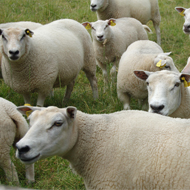Sheep tagging rules due to change

There is no requirement to re-tag lambs born before January 1.
New sheep tagging rules are due to come into force on January 1, 2015, meaning non-EID tags for lambs will no longer be permitted. In addition, ewes and rams tagged before 2010 will now fall under EID rules.
From tomorrow, sheep farmers in England must use a single electronic identification (EID) slaughter tag for lambs that are not being retained for breeding. Non-EID tags will no longer be permitted.
However, lambs born before January 1 may still carry a non-EID tag and there is no requirement to re-tag these animals.
Use of the non-EID tag is still allowed in Wales until January 1, 2016. The National Sheep Association (NSA) has advised Welsh sheep farmers to carefully consider any tagging decisions they make in 2015.
NSA chief executive Phil Stocker, said: "It is has always been important to use the non-EID slaughter tag in prime lambs only and not in store lambs, but this will be even more important for Welsh farmers in 2015, as they will be the only nation still using the non-EID slaughter tag and will reduce their selling options if they use plastic tags in lambs that may be bought for further finishing."
As of tomorrow, ewes and rams tagged before 2010 (known as "the historic flock") must be individually identified on movement records unless they are travelling directly to an abattoir or red market.
Historic flock animals do not need to be retagged with full EID. However, many sheep farmers may choose to do so if it facilitates the movement of older ewes and rams from the historic flock between farms or via markets.
Mr Stocker said: "It is not a legal requirement to retag ewes and rams from the historic flock with electronic identifiers, and we are not for a minute suggesting a gold plating of the rules.
"What we are saying is to carefully consider what moves you are likely to make with older animals in the future and, if these will not be direct to slaughter, double-tagging is likely to be the sensible option. It makes sense to do this when you are handling sheep in the coming months – and don’t forget to make a note in your flock register."



 The Veterinary Medicines Directorate (VMD) is inviting applications from veterinary students to attend a one-week extramural studies (EMS) placement in July 2026.
The Veterinary Medicines Directorate (VMD) is inviting applications from veterinary students to attend a one-week extramural studies (EMS) placement in July 2026.